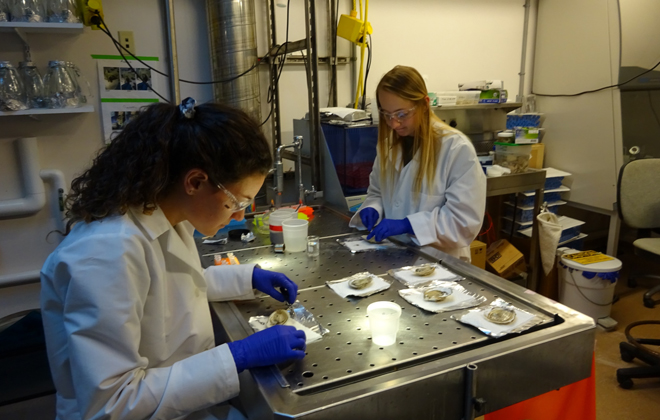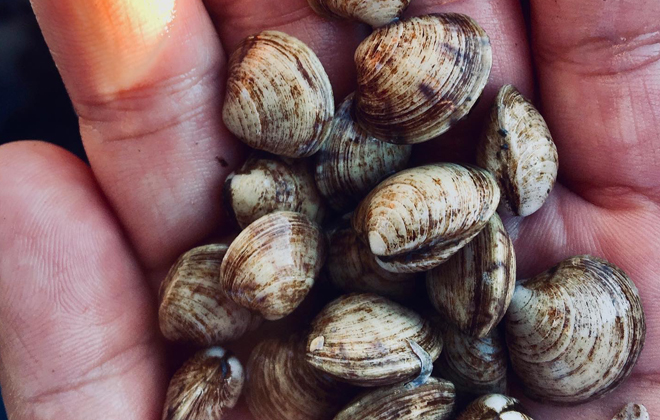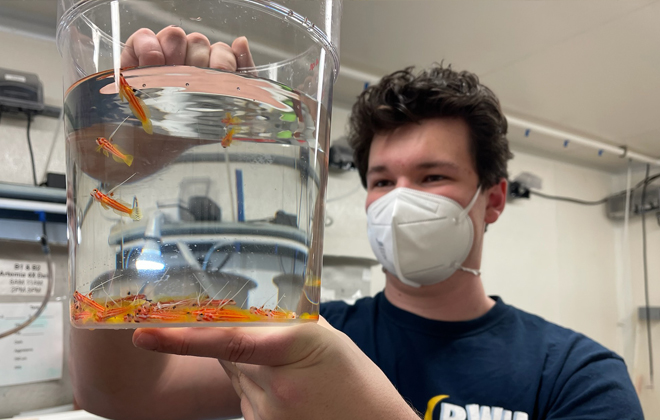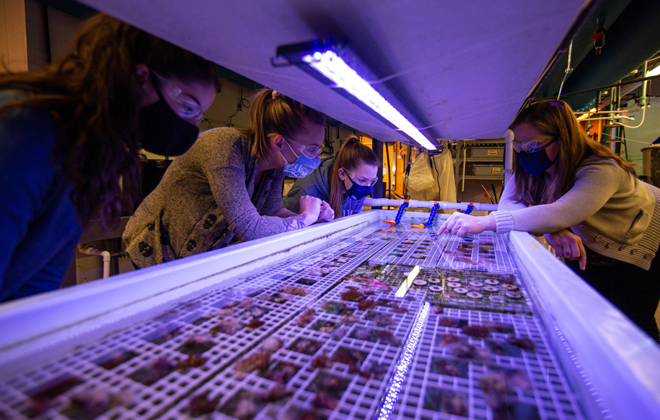
Center For Economic and Environmental Development (CEED)
CEED personnel conduct basic research, develop applied solutions, and provide services toward our mission of preserving the health of coastal and ocean ecosystems, while achieving economic growth and improvement of human health and social equity.
As part of RWU’s emphasis on Blue Economy at a local, regional, national, and global level, the Center for Economic and Environmental Development (CEED) focuses on collaborative marine research, industry support, marine education, public outreach, engagement, and extension.
CEED addresses critical challenges facing human health and the coastal environment through education, research, outreach, and training. Currently, CEED personnel conduct basic research and develop applied solutions for achieving economic growth and improvement of human health and social equity, while preserving the health of coastal and ocean ecosystems. CEED will continue to leverage our coastal location and collaborations with other higher education, research, and policy institutions to focus on critical, timely issues facing coastal and marine ecosystems.
Extension plays a central role in CEED’s mission. In our research and student training, we extend the university’s educational resources by working with members of the coastal community to identify important marine resource issues, conduct applied scientific research in these areas, and share findings with stakeholders in the community. These stakeholders include federal and state agencies, nonprofits, local businesses and many other members of the community. CEED makes it possible for RWU students to take part in extension efforts through research experiences and receive essential training and skill sets for community engagement.
The work of CEED currently focuses on four main program areas:
Shellfish Program
This research program trains students in shellfish hatchery and farm aquaculturing methods and techniques. CEED staff in this program provide support to externally funded faculty conducting basic and applied research on raising commercially important shellfish species. Our hatchery produces seed for a variety of projects and serves as an educational resource to the commercial shellfishing community.
More about the Shellfish Program
Aquarium Science and Aquaculture
This program trains students in raising and caring for aquatic animals. Research and internship opportunities are integrated with hands-on instruction in the design, manufacture, and maintenance of systems. Our CEED students, staff, and faculty design and maintain systems for production of tropical and temperate shrimp, finfish, shellfish, and corals, in addition to large-scale aquarium exhibits.
More about Aquarium Science and Aquaculture
Aquatic Diagnostics Laboratory
With a focus on diseases of aquatic animals (finfish and shellfish), the laboratory provides diagnostic services to the aquaculture industry in the region. Students receive training in aquatic animal health diagnostic and care methods by using a combination of pathological and molecular approaches.
More about the Aquatic Diagnostics Laboratory
Temperate Coral Propagation and Microbial Ecology
This program is focused on the local temperate coral Astrangia poculata, an emerging model organism for studying coral-microbe symbiosis and ecology. The group applies approaches from microbiology, molecular biology, and advanced microscopy to learn more about the response of corals and their microbiomes to climate change. Additionally, CEED students, staff, and faculty have developed techniques and systems in the RWU Wet Lab for sexual and asexual propagation of A. poculata, to support research efforts of the lab, and of the larger temperate coral research community.
Undergraduate Opportunities
The Aquaculture and Aquarium Science (AQS) Major
The Aquaculture and Aquarium Science (AQS) major at Roger Williams University (RWU) operates through the Center for Economic and Environmental Development (CEED). As a major, AQS offers undergraduate students the unique opportunity to engage in hands-on, applied coursework and research covering many aspects of aquaculture, including systems design, culture of marine ornamental species, animal nutrition, and diagnoses and treatments of diseases in aquatic organisms.
Fellowships and Internships
CEED plays an important role in providing research opportunities for our undergraduate students. In addition to conducting independent research with CEED faculty and staff for academic credit, our students have the opportunity to apply for following fellowships and internship opportunities.
CEED Scholarship
Each year the MNS faculty at RWU award research grants to undergraduate students to carry out independent research. Working with a faculty mentor, students write a research proposal, including a budget, which is then evaluated by a committee on a competitive basis. Funds are normally awarded twice a year (Fall and Spring semesters) for use in the following semester (Spring awards can be accessed over the Summer as well). Students participating in funded research efforts also submit a progress report and a final report, detailing the results of their investigation. As a condition of receiving these grants, students present the results of their research, either as an internal or external presentation. Some of these research projects may also result in student publications.
Mark Gould Memorial Research Scholarship
This fund provides students with a stipend to conduct independent research in marine biology, biology, or chemistry during the summer and is awarded to some students each summer. Applicants must be full- time marine biology, biology, or chemistry majors in good academic standing. Students must have completed at least their freshman year. The fund was established in memory of Mark Gould, long-time Professor of Biology and Director of the Center for Economic and Environmental Development at Roger Williams University.
Internships
We encourage students to participate in internships that are relevant to their course of study. These opportunities provide valuable experience and can often lead to advanced study or careers. The university allows a great deal of flexibility for arranging internships for credit - these can be during the school year, or summer. Students can discuss these opportunities with the faculty advisors.
CEED has a cooperative agreement with the New England Aquarium (NEAq) in which students work in Boston, MA or at the NEAq holding facility in Quincy, MA. Internships at NEAq offer college students experience in areas ranging from veterinary services and animal husbandry to communications and program development. A similar internship opportunity is under development with the Marine Biological Laboratory (MBL) in Woods Hole, MA.
Facilities
While other universities may have a waterfront marine field station some distance from the main campus, Roger Williams University is a marine station. CEED is housed in the Marine and Natural Sciences (MNS) building, just a few hundred yards from Mount Hope Bay. We have direct access to the waterfront, and a large, fully functional 7200 ft2 wet laboratory with flowing seawater. This provides us the convenient opportunity to conduct marine field- and lab-based research year-round. The MNS building is equipped with a Wet Lab, a commercial-scale Shellfish Hatchery and Farm, Aquatic Diagnostic Laboratory, Molecular Biology laboratory space, and research greenhouses. MNS houses advanced laboratory resources, including a confocal laser microscope, an epifluorescence microscope, a flow cytometer, a particle counter, thermal cyclers, controlled environmental growth chambers, and analytical chemistry instrumentation. On board RWU’s research vessel, the InVinceble Spirit, our faculty, staff, and students launch from our own 200-ft learning platform/dock for coursework, water quality testing, or collection of aquatic organisms.







